Alexander J. Motyl's Blog, page 20
April 21, 2013
Ukraine's Regionnaire Party Panics
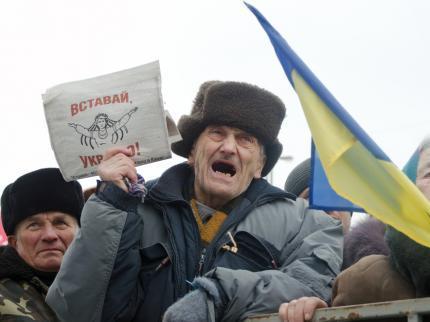
The Regionnaires are panicking. They know they’re in trouble and they don’t know what to do about it.
On February 28th, the Donetsk provincial leadership met with local leaders. One of them, the mayor of Kramatorsk, Hennadii Kostyukov, informed the assembled big shots of the following:
Young people use the Internet today. I am more than certain that in no other country, aside from Russia and us, do they write such filth about the first persons of the state … They sow mistrust in young people and thereby raise an entire generation of nihilists … This is very serious. The year 2015 is before us, and we’re losing time.
Kostyukov doesn’t get it: the Regionnaires haven’t just lost time in the run-up to the 2015 presidential elections. They’ve lost the hearts and minds of everyone under the age of 50. In particular, Internet-savvy young people—and Donetsk, with its many universities, is full of them—know that the people running the Party of Regions (and, not incidentally, running the Donbas into the ground) just don’t measure up. The Regionnaires have lost that constituency and, thus, the battle for the future. Small wonder that, when Kostyukov finished his talk, someone from the audience drew the logical conclusion and cried out: “Kill them all!”
On March 30th, the Donetsk mayor, Oleksandr Lukyanchenko, gave the Donetsk provincial conference of the Party of Regions more bad news:
Mistakes and difficulties in the economy and the slow pace of reform have disappointed the population and sown popular mistrust of the authorities. The number of our supporters is declining. Some of the center’s decisions directly harm urban and rural territorial communities. Thanks to the center’s mistakes, the people in our region are suffering.
Ignore Lukyanchenko’s wooden bureaucratese, which is typical for old communist apparatchiks. Consider only that he is accusing the Yanukovych regime of failing its own voters. To be sure, he puts the blame on vague mistakes and difficulties and on “some” of the center’s decisions. But Regionnaire ex-communists know full well that those seemingly anodyne references conceal a blistering criticism of Kyiv’s incompetence. And the kicker is, of course, this sentence: “The number of our supporters is declining.” When a Regionnaire is forced to admit that his party’s hegemony may be impermanent, you can be sure that the situation is dire.
Then, on April 4th, a meeting of the Donetsk provincial council heard one of its deputies, a certain Ordash Dadashov, engage in this complaint:
After the provincial council voted on drilling for nontraditional gas in the region there was unleashed a campaign of discrediting the members of the Party of Regions who, as provincial deputies, voted for this decision. The Artemovsk city website contained a large portrait of our president and provincial deputies with the caption “Traitors of the Donbas.” I ask that you task the appropriate agencies to find out who’s behind this. As we approach important electoral events, the Party of Regions and the party’s members in the provincial council do not need this.
Dadashov is quite right: the last thing the Regionnaires need is free speech.
That Dadshov’s party agrees with him was made evident on April 3rd, when the Press Service of the Party of Regions interpreted an incident in which some of its members were pelted with snowballs in Kyiv as heralding the rise of fascism.
The Party of Regions will not ignore this occurrence and demands that the organs of order find these brutes and give an appropriate legal response to their crimes … Sowing enmity and hatred among Ukrainian citizens, the opposition leaders Tyahnybok, Yatseniuk, and Klitschko are pushing the country toward chaos, thereby satisfying their political ambitions. Promoting fascistically inclined fighters is nothing less than the demonstratively public manifestation of political terrorism and a resurgent neo-Nazism.
(Fascism, like nationalism, has obviously become a meaningless term in Ukraine. I’ll devote a few blogs to both concepts a few weeks from now.)
Meanwhile, one Regionnaire has decided to jump ship. Valery Konovalyuk, appointed President Yanukovych’s adviser in 2010, provided this spot-on analysis of the failures of the regime on his Facebook page in late April:
So there it is! I’m no longer an adviser to the president of Ukraine … And nothing connects me to the Party of Regions for the last year … I have nothing to say to Viktor Yanukovych … All my many statements and comments about the situation in the country, about the disastrous and ineffective economic policy, about the absence of real reforms, about the extent of corruption and abuse, about the low level of executive authority and discipline and much, much more … What is currently taking place (and I have issued many warnings to this effect) is the direct route to crisis and the country’s bankruptcy. It’s a complete rejection of the promises and commitments made three years ago, and a betrayal of those who for many years gave their support and believed in the development and blossoming of Ukraine!!!
April 11, 2013
A Defining Moment in Ukraine's Future
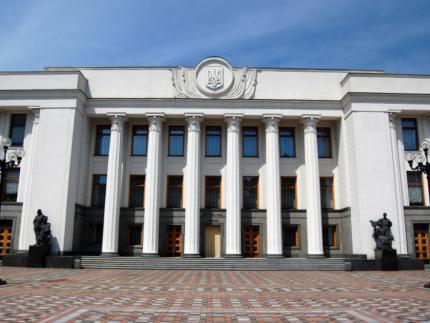
When, on April 4th, the Party of Regions responded to the opposition’s continued blockade of the parliamentary podium by leaving the Rada premises and setting up its own legislature on Bank Street, near the president’s office, it effectively created a condition of what the Bolsheviks once called “dual power.” Russia’s socialists did the exact same thing when, in the aftermath of the czar’s overthrow in the February Revolution of 1917, they established the Soviet of Workers’ and Soldiers’ Deputies in Petrograd. Lenin’s Bolsheviks used the Soviet to launch their own coup in November of that year.
If there’s one thing the Regionnaires know, it’s their Soviet history. Well-schooled in Communist Party lore, they knew that, in moving the Rada’s seat to Bank Street, they weren’t just responding to the democratic opposition’s filibusters. The Regionnaires had to know they were creating what Lenin understood as a “revolutionary situation”—an unstable condition in which the legitimate authorities are effectively challenged by revolutionaries. When I told an ex-Sovietologist of mine about this development, he responded with three short words: “That’s very bad.”
The reason it’s very bad is simple. Dual power is intrinsically unsustainable. You can’t have two parliaments or two presidents or two popes. Once a condition of such “binary opposition” emerges, there is no room for compromise. One side has to cave; one side has to prevail. Or the ultimate power holder, President Viktor Yanukovych, has to resolve the standoff by knocking heads together or by abolishing both bodies.
The Regionnaires will never admit that their rump parliament is illegal—which of course it is—or that the laws it passed are bogus. Quite the contrary, Speaker Volodymyr Rybak has even sent four such pieces of legislation to Yanukovych for his signature. If the Regionnaires wish to define legality in terms of their actions rather than existing rules (which seems to be the case), then anything they do must be a priori legal. End of story. The opposition may eventually back down and thereby acquiesce in the Regionnaire coup, but some democrats will not. If the standoff between the two Radas continues or is ever revived, one side will, by the force of logic of the revolutionary situation, have to repress the other—or, as Lenin put it, “Kto kogo?” (“Who gets whom?”). As journalist Serhii Leshchenko says, “We are entering very difficult times. What struck us as ‘bad’ or ‘illegal’ in the past will now appear to be child’s play compared to what awaits us ahead.”
If and when the regime turns against the democratic opposition à la Belarus, Russia, and Uzbekistan, Yanukovych’s legitimacy, already flagging, will go into negative numbers. Worse, he’ll have to admit that he is a dictator supported by an illegitimate parliament incapable of pursuing reform, promoting European integration, and saving the economy from collapse. Yanukovych will own the entire mess. The European Union will never sign an Association Agreement with Ukraine’s version of Robert Mugabe, while Russia’s President Putin will turn up the neo-imperialist pressure on Little Russia. Yanukovych will finally be completely isolated—from the world and from his people.
Even if Yanukovych has the sense to mediate a compromise between the two Radas, the precedent—and, thus, the ongoing threat—of dual sovereignty will have been set. The only solution to such an implicitly unstable condition is to abolish the existing Rada via a referendum, establish a rubber-stamp institution in its place, and institute a winner-take-all single round of presidential elections, in the hope that the opposition will be unable to agree on a single candidate for the 2015 elections.
This approach could end up destroying Ukraine. If the Regionnaire Bolsheviks exclude a majority of the country from having a voice, and if Yanukovych wins the ballot by dividing the majority, the cleft between the Regionnaire thugs and the democrats will only grow, and the overlapping divides between supporters of Europe and supporters of Russia, between supporters of modernity and supporters of the Soviet past, and between supporters of Ukrainian independence and Little Russian vassalage will deepen. Social, cultural, and economic tensions will increase and large-scale civil disturbances will become likely. Once violence, either from below or from above, enters the picture, as it certainly could in this scenario, Ukraine will become ungovernable. At that point, Europe’s Zimbabwe may become Europe’s Syria.
April 8, 2013
EU's Double Standards Don't Come Cheap in Cyprus
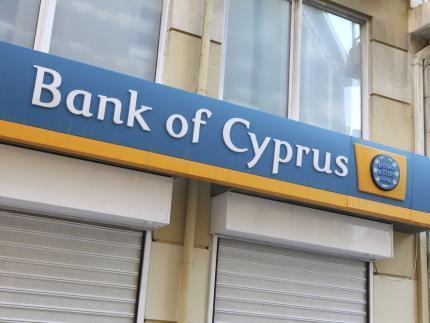
If you’ve been following the ongoing banking crisis in Cyprus, I bet you’ve experienced a twinge of Schadenfreude upon learning that the Russian oligarch money stashed away in the island-state’s financial institutions may be hit the hardest.
According to the BBC, “It is estimated that about one half to a third of all Cyprus bank deposits are of Russian origin. The ratings agency Moody’s estimates that there is about $31bn (£20.3bn) of Russian money in Cypriot bank accounts—$12bn from banks and $19bn from businesses and individuals.” Der Spiegel, meanwhile, reports that “In 2011 alone, some $80 billion flowed out of Russia and much of that money had been channeled through Cyprus, according to the BND [the German foreign intelligence service]. Russians have deposited $26 billion in Cypriot banks, says the BND. That is well above the annual GDP of Cyprus.” Whatever the exact amount, it’s pretty clear that vast sums of Russian money have been deposited in or passed through Cyprus.
It’s also largely undisputed that a lot of that cash represents the ill-gotten gains of Russian oligarchs and crooks who, wisely, have taken advantage of Cyprus’s lax tax laws to park their money beyond the reach of the Putin regime’s claws. As Der Spiegel points out: “The Russians don’t just love Cyprus for its great climate. The shell companies here are conveniently anonymous, the banks discreet and the taxes are low. Dirty money bestowed a lasting boom on Cyprus.” The Guardian’s Stefan Meister is more generous: “For years, Russia’s biggest companies have been using Cyprus as an offshore business hub, as the island enjoys unique tax rates and legal conditions in Europe. But that doesn’t necessarily mean Russian tycoons are illegally burying their money in Cyprus—they may just be using it as a perfectly legal transition center for dealings with Europe.” Whichever your preferred interpretation, you can’t blame Russian thieves for preferring a European safe haven for their money, beyond the reach of Russia’s fascistoid regime. That’s a no-brainer.
Roman Olearchyk of the Financial Times argues that Ukrainian oligarchs have suffered far less than their Russian counterparts in the crisis, because the Ukrainians apparently use Cyprus as a channel for getting their money into Europe proper. Olearchyk cites Jorge Intriago, a partner at Ernst & Young in Ukraine, as saying: “I really doubt that Ukrainian funds are being caught up by the one-off Cypriot levy on deposits. In my view Cyprus is not an investment destination in which Ukrainian investors keep large amounts of funds. For Ukrainian business the whole purpose is to use Cyprus as a conduit to repatriate funds out of Ukraine and into other jurisdictions in a tax-efficient manner.”
There’s another term for “a conduit to repatriate funds out of Ukraine and into other jurisdictions in a tax-efficient manner”: money-laundering.
Now I can’t imagine that Ukraine’s oligarchs and crooks have figured this out but Russia’s haven’t. So if the Ukrainians are using Cyprus to sneak their money “tax-efficiently” into Europe, so too are the Russians. And you can well imagine that the sums involved are likely much greater than those in Cyprus banks. Small wonder that the European Union has taken so kindly to this, er, conduit.
According to the BND, “Formally, the island nation sticks to all the rules on combating money laundering laid down by the EU and other international agreements, the agency said. The country had passed the necessary laws and set up the required organizations. But there were problems when it came to implementing those rules, it added. They weren’t being applied properly. The Cypriots, the BND said, sign everything, pledge a lot, but keep few of those promises.”
Call me an unreconstructed cynic, but I suspect the EU’s financial watchdogs have been fully aware of what was going on in Cyprus. Likewise, it’s a safe bet that Germany’s watchdogs, which supervise Europe’s watchdogs, have been well aware that Russian and Ukrainian mobsters have been washing their money through Cyprus before it flowed into their own countries.
The problem for the EU is that such venality directly contravenes everything the European Union claims to stand for: rule of law, honesty, integrity, human rights, democracy, and all that other stuff Brussels continually intones. Logically and morally, you can’t have it both ways: you can’t support dirty money at home and criticize it abroad. By trying to have it both ways, the EU behaves no differently than President Viktor Yanukovych and his crooked Regionnaire pals. Small wonder that Yanukovych thinks he can pull a fast one on the Europeans. If we know that the EU welcomes billion-dollar inflows from dubious Russian and Ukrainian sources, so does Yanukovych. If we know the EU tolerates corruption on a vast scale, Yanukovych has figured that out, too. So why shouldn’t Yanukovych think that Europe’s insistence on Ukraine’s adherence to rule of law as a precondition of any Association Agreement with the EU is a joke?
March 31, 2013
Snow Storm Shuts Down Ukraine
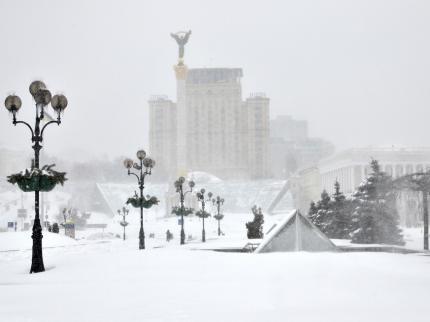
For a president who regularly engages in snow jobs, you’d think Viktor Yanukovych would have been better equipped to handle the massive snow storm that descended on large parts of Western Ukraine and capital city Kyiv on March 22nd to 24th. Instead, he and his Regionnaire minions were once again caught unawares.
The snow came suddenly and unexpectedly, and it made streets, sidewalks, and roads virtually impassable, leading to huge traffic jams and the cancellation of virtually all flights in and out of many of Ukraine’s airports. Public transport was battered, and electricity supplies were affected in some parts of the country. Almost overnight, Ukraine and Ukrainians were snowed in.
Smart and competent politicians would have known what to do. Major flooding in Germany in late 2002 enabled Gerhard Schröder to snatch victory from the jaws of electoral defeat by rolling up his sleeves and visibly assisting affected citizens cope with the disaster. During Hurricane Sandy, New Jersey Governor Chris Christie went to the people and actually extended a helping hand. Both politicians understood that natural disasters can have high political dividends if handled correctly—with genuine compassion and extensive hands-on involvement.
Not so the Ukrainian president and his Regionnaires. Why didn’t Yanukovych and his boys put on their jeans and anoraks, pick up a few shovels, and trudge down to Kyiv’s Broadway, the Khreshchatyk, and start cleaning the street? Why didn’t Prime Minister Azarov do the same? Or, for that matter, the quasi-mayor, Oleksandr Popov?
The Yanukovyches are a hardy lot: Dad works out, Junior drives fast cars, and the Dentist is a whiz at making money. Surely they could’ve decided that the advantages of good PR outweighed the discomfort associated with ruining their ostrich-leather shoes? Obviously, it never occurred to any of these guys that sharing in the people’s hardships—or, even, pretending to share in their hardships—might be a good thing to do. For themselves, if not for the unwashed masses. You have to be exceptionally obtuse or exceptionally arrogant or exceptionally indifferent to behave this way.
Instead, both Yanukovych and Azarov displayed their displeasure with quasi-mayor Popov’s cleanup efforts. Popov, naturally, passed the buck to his deputy, whom he fired a few days after the snows stopped falling. Popov’s incompetence is, of course, partly the result of his being a Regionnaire politico surrounded by Regionnaire politicos: doing a good job is not part of their job description. But, to be fair, Popov is only a truncated mayor. Formally, he’s the head of the Kyiv City State Administration, a position he’s occupied since Yanukovych appointed him in November 2010. In effect, Popov doesn’t run Kyiv. His boss does. Which means that the responsibility for the mess falls squarely in—yup, you guessed it—Viktor Yanukovych’s lap.
That’s what you get when you aggrandize too much power: you become responsible for everything and you get blamed for everything. Is that fair? Actually, yes. After all, no one asked Yanukovych to assume the mantle of Ukraine’s sultan. Now the stuff has begun melting and parts of Western Ukraine and Kyiv will soon be under water. The president will blame Popov. Popov will bite his lips. But everyone will know where the buck stops.
Meanwhile, knowing full well that they can’t count on a dreadful regime to do anything on their behalf, Ukrainians have taken matters into their own hands. Out in Western Ukraine, they initiated campaigns to save the storks. In Kyiv, locals organized their own shovel brigades and started cleaning the city. With every motion of the shovel, the people are effectively telling the regime to melt away like the snow.
March 21, 2013
A Ukrainian Gas-State?
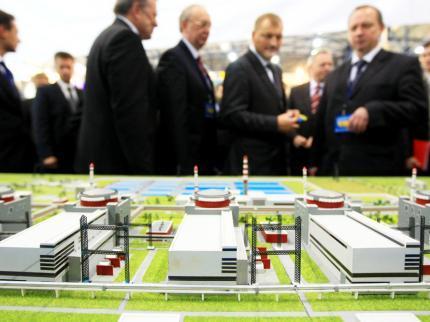
Is the shale-gas deal President Viktor Yanukovych signed with Royal Dutch Shell on January 24th good news or bad news for Ukraine?
Here, according to Radio Free Europe/Radio Liberty, are some of the details:
Under the agreement, the Yuzivska shale-gas field in eastern Ukraine would be tapped using the controversial new technology of hydraulic fracturing, or fracking. Ukraine is believed to have an estimated 1.2 trillion cubic meters of shale-gas reserves, the third-largest such deposits in Europe. Ukrainian officials say Shell’s investments would likely be around $10 billion but could go as high as $50 billion. Environmental groups say chemicals used in the fracking process can threaten the health of surrounding communities, but the industry has aggressively challenged those claims.
The good or potentially good news is:
First, it’s now conceivable that Ukraine could, within the next five to ten years, meet all its natural-gas needs with its own reserves. There might even be some left over for export. Energy dependence on Russia would end, Ukraine’s gas pipeline network would remain Ukraine’s, and the billions ending up in Gazprom’s coffers would stay in the country. Relations with Russia could improve because the major bone of contention between the two countries—energy—would have been removed. And if they don’t improve, they will at least have been clarified. If President Vladimir Putin continues to press for Ukraine’s integration into Russia’s sphere of interest, even the most obtuse Regionnaire will have to see that it’s just a nakedly imperialist ploy.
Second, it’s not inconceivable that foreign direct investment, which has plummeted since Yanukovych’s election in 2010, might revive. If nothing else, Shell has committed to investing $400 million in 2013. If Shell does well, other firms may follow. Naturally, oil and gas multinationals have a higher tolerance for risk than run-of-the-mill businesses, and the risk of investing in a profoundly corrupt country will continue to remain high. Even so, a bit more money is almost certain to flow in.
Third, as Neil Buckley of the Financial Times says, “What could alter the investment environment … is if reduced reliance on Russian gas imports—thanks to the Shell deal and others—frees Ukraine to integrate more closely with the European Union. And that means signing a long-awaited free trade and political cooperation deal. Foreign trade officials in Kiev suggest quite a few foreign companies are poised to invest into Ukraine’s agri-business and food processing industry, for example—if only it would sign the trade deal, allowing them to export freely into the EU single market.” Obviously, reduced reliance on Russia isn’t enough to promote Ukraine’s integration into Europe. Yanukovych will also have to free Yulia Tymoshenko, embrace rule of law, and demonstrate his opposition to corruption.
Fourth, if the experience of states such as Pennsylvania is any guide, local populations stand to make some money from shale gas. Since Ukraine’s provincial population is desperately poor, Shell’s developmental activities could improve living standards and, in the medium to long run, enhance cultural self-awareness and political self-empowerment.
But there is also a significant down side to the gas deal:
First, even if one disregards concerns over the environmental impact of fracking, even if done properly, the fact of the matter is that properly done fracking can take place only if the authorities, the scientific community, and the local populations insist on it and the gas company understands that it will pay a hefty price for negligence. Unfortunately, neither the central nor the regional authorities in Ukraine will care much about whether fracking is pursued properly or not; Ukraine’s scientific community has no clout; and local populations are powerless. Will Shell, a European company par excellence, remain committed to the European Union’s vaunted “European values” or will it treat Ukraine as a colonial appendage of the Dutch empire? Will the EU insist that Shell be a good citizen or will it hide behind the Schengen Line? These are important questions.
Second, given the deeply corrupt nature of the entire Ukrainian state, it’s not at all clear that any of the benefits of gas development will trickle down to the population. Does anyone seriously think that local corruptioneers will permit villagers and townsfolk to make any money? Ditto for the Yanukovych regime in general and the Yanukovych Family in particular. It’s said that the oligarchs have stolen all there is to steal in Ukraine: not anymore. With potentially huge shale-gas profits, the opportunities for theft will only increase. Does anyone doubt that the president’s pals won’t divvy up the loot? Naturally, the money they steal won’t be invested in infrastructure or modernization of obsolete plants or education or housing. It’ll go to building more villas and buying more Mercedes and acquiring more property in Western Europe.
Third and most important perhaps, ample gas means “easy money” for the regime and corrupt, authoritarian regimes with easy money almost always become more corrupt and more authoritarian. When non-corrupt democracies come upon easy money, many benefit: consider Norway, Canada, Great Britain, and the United States. As the journalist Tina Rosenberg writes, “Every nation wants to strike oil, and after it happens, nearly every nation is worse off for it. It may seem paradoxical, but finding a hole in the ground that spouts money can be one of the worst things that can happen to a country.”
Gas isn’t oil, but the consequences of the resulting “resource curse” are similar. According to Rosenberg:
Oil is the world’s most capital-intensive industry, so it creates few jobs. Worse, it obliterates jobs all across the economy. The export of oil inflates the exchange rate, so whatever else a country manufactures is less competitive abroad. Oil concentrates a nation’s economy around the state. Instead of putting resources into making things and selling them, ambitious people spend their time currying favor or simply bribing the politicians and government officials who control oil money. That concentration of wealth, along with the opacity with which oil can be managed, creates corruption. … The list of the world’s worst-governed countries today features many that are dependent on the production of oil: Nigeria, Angola, Chad, Venezuela, Libya, Equatorial Guinea.
And consider Ukraine’s post-Soviet neighbors: Russia, Kazakhstan, Azerbaijan, and Turkmenistan. They all have huge oil and/or gas deposits and they are all consolidated dictatorships with extremely high levels of corruption.
By this logic, the profoundly corrupt and increasingly authoritarian Yanukovych regime will use the easy money from shale gas to become even more profoundly corrupt and authoritarian, coming to rely even more on the forces of coercion to stay in power. Ukraine’s already uncompetitive economy will become even less competitive, and its population poorer. With growing popular anger at an illegitimate and repressive regime, the potential for a huge popular explosion will rise. As Rosenberg pithily puts it: “Petro-dependence also leads to conflict.”
The moral for Ukraine’s democratic opposition should be clear. If they let Yanukovych win the 2015 presidential elections, he will be the beneficiary of easy money and Ukraine’s chances of experiencing a bloody breakdown will greatly increase. Or, to put it another way, whether or not Ukraine becomes Nigeria is now up to the EU and Shell on the one hand and Ukraine’s democratic opposition on the other.
March 14, 2013
An Isolated Yanukovych
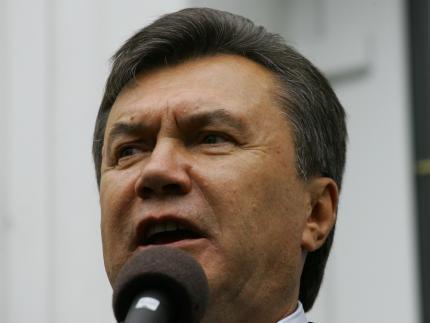
A behind-the-scenes powerbroker most people have never heard of has some interesting things to say about the Yanukovych regime and the Regionnaires in a recent interview. The 63-year-old Hennadi Moskal has occupied a variety of highly placed positions in the Ministry of Internal Affairs and the Security Service and has also served as governor of Luhansk and Zakarpattya provinces and as President Yushchenko’s permanent representative to the Crimea. In a word, Moskal knows both the “power ministries” and the country. He also happens to have been a parliamentary deputy for a few years, most recently having been elected in October 2012 on the democratic-opposition ticket.
Yevgenii Kuzmenko, of the Social Communication website Obkom, interviewed Moskal on January 29th. What, Kuzmenko asks, does Moskal think of the fact that President Yanukovych is appointing “his exclusive little soldiers” to positions of authority?
I believe that today the president’s greatest mistake is to form his team on the basis of their common regional roots. That’s the road to nowhere…. Ceausescu also picked his team on that basis. And as soon as there appeared a revolutionary situation—when Ceausescu was met with shouts of “Down with Ceausescu!” at a meeting—within ten minutes the minister of defense, the minister of internal affairs, and the head of the Securitate ran away…. The same will happen in Ukraine! Someone will take a pot shot and you’ll see how quickly Yanukovych’s team will disperse.
But, says Kuzmenko, isn’t Yanukovych giving all the important positions to his son’s friends so as to avoid the Ceausescu scenario?
The people he appoints should be moral authorities. Just because they’re going to say something doesn’t mean anyone will follow orders! … You can’t appoint only people from Donetsk to the 300,000-strong militia. That’s impossible. So they replace the leaders. But are these leaders moral authorities for the rank and file? Of course they’re not! Do they provoke annoyance? Of course, they do! … I speak to these people every day. There’s no love for the party and no love for the leaders! The situation in the country is now such that we have people to give orders—the hierarchy has been formed—but there’s no one to follow them. And once the situation in Ukraine becomes more complicated, no one will follow orders!
Unfortunately, the interviewer says, the opposition looks weak and powerless.
So do you want the opposition to call for an armed uprising? Are Tyahnybok, Yatseniuk, or Klitschko supposed to climb atop a tank?
So, wonders Kuzmenko, just how is the regime to be removed? By another colored revolution, via elections, or, “heaven forbid,” by means of violence?
There are several components here. First, the opposition in today’s Parliament is much stronger and much better than in 2007. Second, the economic situation in the country undermines the position of the authorities. And third, the government and presidential administration are sitting on a branch that they themselves are cutting with their incorrect internal and external policies. At some point these three factors will combine to form a powerful mixture. And I can state unequivocally that it’s inevitable…. I understand that people’s expectations today are more radical and that society is radicalizing, and that’s what they expect from the opposition. I understand that perfectly, but the fruit must ripen. It shouldn’t be eaten when it’s still green.
Then Kuzmenko shifts the conversation to the power ministries and the Regionnaires. So what’s going on in the Security Service?
Believe me, there are no pro-presidential attitudes there. Quite the contrary, there is hidden sabotage and lack of acceptance. But these are people who speak little. They’ll share their views only with people they know…. The country’s leaders also overstate the role of the Ministry of Internal Affairs.
Well, asks Kuzmenko, doesn’t Moskal think that the recently formed Ministry of Income and Taxes will become the key instrument of repression of the “late Yanukovych epoch”?
But how can you repress someone who has nothing? What will they take from me? My jeans, my jacket, my tie? … People like me comprise 99 percent of the country. Only 1 percent has something that can be taken. And they are the authorities and the Party of Regions.
So, says Kuzmenko, will they start expropriating their own people?
Who else? They’ll do what the Bolsheviks did: steal what was stolen. Who else can you steal from?
The Regionnaires, suggests Kuzmenko, can’t be too happy with the current state of affairs in the country.
Indeed, discontent is very large. They’ve understood that brute force no longer works…. Their attitude is defeatist, like that within the Soviet Army in 1941. I know many in the Party of Regions: there are enough smart, literate, and educated people there (it’s not true that the Party of Regions consists only of criminals, although it’s true that there have never been as many in the party as today). These people look around them and say: “Where is this all leading?” This is no longer the monolithic Party of Regions that came into Parliament in 2007.
Yanukovych must sense that his own cadres are grumbling and could at some point even be tempted to go against him. Why else would the Higher Administrative Court, which consists of Yanukovych flunkies, strip Yulia Tymoshenko’s defender, Serhii Vlasenko, and Regionnaire small-fry Andrii Verevsky of their status as parliamentary deputies on the grounds that the law forbids having outside jobs? Yanukovych is signaling to all disgruntled deputies that one false step could lead to their forfeiture of the goodies that come with deputy status. The opposition already knew that, just as they knew that opposition could land them in jail. Now the Regionnaires know it as well. Worse, Yanukovych’s Ministry of Income and Taxes can now swoop down on them and seize their assets.
Yanukovych’s moves are acts of desperation, and the Regionnaires, who are well versed in the art of treachery, know full well that the new ministry and the court’s decision are just signs of the regime’s isolation, illegitimacy, and weakness. Now is the time to start looking for ways to jump ship. Of course, Yanukovych knows they know, so expect him to react in the only way he knows how: by accumulating still more power, waving his fists, and retreating into even more complete isolation.
Moskal’s final two sentences nicely summarize the condition of the Yanukovych regime:
Well, since they’ve gotten into this dead end, it’s necessary to find a way out. Instead, they’re only making things worse…
March 10, 2013
Yanukovych’s Information Bubble
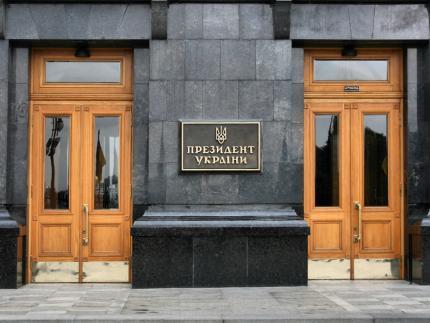
One of Ukraine’s best investigative journalists, Serhii Leshchenko, recently revealed a tidbit about President Yanukovych that shocked me. Read the following excerpt from his blog and see if you catch the jaw-dropping, eye-popping, mind-blowing part:
That Yanukovych doesn’t hear journalists is half the problem. He doesn’t hear his citizens. He wakes up in [his palatial estate outside Kyiv], which is surrounded by a six-meter-high fence and guarded, not by the Berkut special forces, but by an Anti-Aircraft Defense unit of Ukraine’s armed forces. He travels in a heavily guarded cortege along the Kyiv-Nova Petrivka highway…. Then he takes cordoned-off streets to get to [the presidential building], where he ends up in the closed bubble of the presidential administration…. His circle of associates is confined to his closest advisors, hunting friends, and his fawning subordinates. Every time Yanukovych goes out he is accompanied by an army of guards… There is no computer in Yanukovych’s office.
OK, I saved it for last. There is no computer in Yanukovych’s office. Come again? Yup, you heard right: There is no computer in Yanukovych’s office.
Now, Leshchenko is too good a journalist to have gotten this wrong, so, when he says Yanukovych has no computer in his office, he means Yanukovych has no computer in his office. That also means he has no Internet, no Skype, no e-mail.
Consider the implications of that fact.
For starters, the Prez ain’t reading my blog. Darn.
Second, he is completely cut off from the vast amounts of information that are circulating on the Web. In effect, globalization has passed by Yanukovych or, more exactly, he’s decided to ignore it. Now you don’t need to be Bill Gates to be a successful policymaker in today’s world, but I, for the life of me, can’t see how someone without access to the Internet can have a clue of what’s going on in his country and the world.
Third, Yanukovych’s self-imposed exile from the world means that the information he does get is filtered, chosen, and possibly tailored by his minions. Of course, they know the boss wants to hear good things, so it’s very likely that they don’t provide him with bad news. You expect minions to act that way everywhere, but when leaders have access to their own information sources, they can at least raise an occasional eyebrow when their subordinates feed them nothing but good news. Yanukovych, clearly, has no way of knowing when to raise an eyebrow.
Finally, next time Yanukovych talks about e-government and openness, you’ll know he’s just pulling your leg.
Small wonder that, when Yanukovych gives press conferences, he invariably smiles a lot, nods, and says absolutely nothing. The latest such performance took place on March 1st. Journalists asked him if his son Sasha’s the Dentist’s meteoric rags-to-riches rise to multimillionaire status had something to do with the fact that all his pals run the government. Here’s how Yanukovych answered:
You can direct that question at him personally. As far as I know, he has a bit more time and meets more frequently with the press. No one will refuse you. Ask and he’ll tell you. I know no details. I know he’s used to working a lot. He knows how to work and has a good team.
Most of the journalists probably thought Yanukovych was being evasive. I’m not so sure. I mean, heck, why should we assume that, just because the whole world knows something, Yanukovych must know it too?
Back on December 11, 2012, Yanukovych’s other firecracker son, Viktor Junior, wrote the following:
It’s difficult to imagine the future of Ukraine when 60 percent of its administrators don’t know how to use computers. We have enough young, courageous, and enterprising people who could easily replace all those who are “stuck” in the past.
For once, Junior’s on target. Just about any young, courageous, and enterprising person in Ukraine could easily replace a president who is stuck in a bubble of his own making.
February 28, 2013
Citizens Derail Oligarch's Mining Development Plans in Ukraine
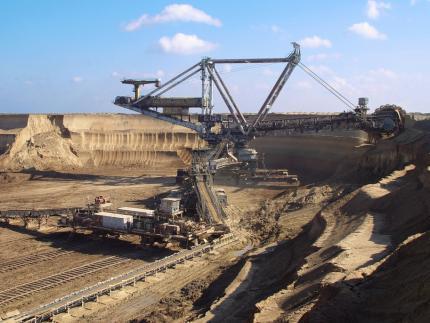
Here’s more evidence busting the myth of Ukrainian passivity and indifference.
The residents of Kremenchuk, a city of 230,000 southeast of Kyiv on the Dnipro River, and its environs are up in arms over oligarch Kostyantyn Zhevago’s plans to build the Bilaniv Mining and Enrichment Combine (HZK) on the Psol River in Kremenchuk District. According to Zhevago’s plans (pdf), about 12 villages comprising one fifth of the district’s territory would have to go to make room for the combine.
Besides opposing the displacement of thousands of villagers, the inhabitants of the region, together with community activists and scientists, fear an environmental catastrophe—ranging from the destruction of the Psol to massive air and water pollution to permanent changes in the area’s ecological balance. The specific bone of contention is the “Draft Plan of the Territory of Kremenchuk District” developed by the Urban Construction Division of the local government, the Kremenchuk District Administration. The activists insist that it fails to safeguard the region’s environment and must be revised. The bureaucrats and Zhevago people say it’s fine.
The 39-year-old Zhevago is worth a few billion and has a growing mining and minerals empire in Ukraine. He controls the “Finances and Credit” group and has been a parliamentary deputy since 1998, usually as a member of the Yulia Tymoshenko Bloc. Most recently, in the October 2012 parliamentary elections, he ran as an independent candidate in the town of Komsomolsk and won 60 percent of the vote. Komsomolsk happens to be the site of one of his plants, the Poltava Mining and Enrichment Combine (HZK).
As Lyudmyla Kucherenko, an environmental activist, president of the Poltava Province Media Club, and critic of Zhevago’s plans, says bitterly: “It’s unlikely that the oligarch, who lives mostly abroad and views Kremenchuk District as a colony for acquiring large profits from the extraction of resources, will listen to the people or heed the laws that he, as a legislator, approves! It’s small wonder that Karl Marx wrote in Capital that there is no crime a capitalist wouldn’t commit for the sake of 300 percent profits.”
Construction of the Bilaniv plant is part of an ambitious plan for Kremenchuk District developed by Ferrexpo, a Swiss-based iron-ore-producing company controlled by Zhevago. Ferrexpo built the Poltava HZK and is currently completing construction of the Yerystiv HZK. Also in the works is the mega-plant, Vorskla-Stal. According to its website, “the management company Vorskla Steel AG is currently managing metallurgical assets in Ukraine, Hungary, and Denmark. Currently our largest asset that is being built is an electric steel plant of direct reduced iron with the use of natural gas in Komsomolsk, Poltava region, Ukraine…. The capacity of Vorskla Steel plant is 3 million tons annually that is 8-10% of production volume of metallurgical branch of Ukraine.”
Read the following, also from Vorskla’s website, and you’ll understand just why local inhabitants are worried (and English-language purists should be aghast):
As of today 410 000 m³ of soil has already being taken out, 350 km of drainage trenches have being laid out and filled with 400 000 m³ of macadam and 2 mln m³ of sand. In a peak period up to 360 people and 180 pieces of equipment have been working on the site…. Now project has full support of local authorities and community. Vorskla Steel is a socially responsible company that is why it has started plenty of philanthropic projects, like supporting local school and kindergarten, patronage of local veterans organization. The company cares of cultural and educational development of region, therefore constantly supports organization of ethnic festivals, competitions, and various celebrations. Vorskla Steel is aware that this project is an extraordinary one. There are no analogues in Ukraine, therefore obviously, certain problems and obstacles can occur, but having the team of professionals it successfully overcomes them. The factory will be built on time. And along with development of this project the whole region will be developing.
Extraordinary, perhaps—but the “full support of local authorities and community”? The local authorities for sure, but that’s because Zhevago runs Komsomolsk. As to the community, it’s pushing back, while the self-satisfied tone of the above paragraph more than lends credence to villager complaints that the developers are running roughshod over the countryside and ignoring their interests.
The push-back has been going on for about two years, and its latest expression was a public demonstration on February 13th before the Kremenchuk District Council and District Administration. (Significantly, right-wing Svoboda activists were there, winning brownie points with the local population.) Holding posters with the following demands—“Hands off our God-given land!” “Shame on the enemies of the environment!” “Poltava Province is the heart of Ukraine: Don’t rip out its heart!”—the activists insisted that the draft plan be taken off the council’s agenda. Amazingly, the council caved, at least for now.
What’s next? Kucherenko isn’t optimistic: “There are no guarantees that the oligarchs and venal bureaucrats will abandon their intention to transform the district into a gigantic quarry, while making billions by neglecting the rights of their poor countrymen and women and by mercilessly exploiting natural resources.”
Still, Zhevago and the other oligarchs now know that their greed has to be curbed—if only a bit. More important, the people are fired up. They care.
The Ukrainian rock star Skriabin sings an awfully sad song with the following refrain: “My country is a total ruin / How can they detest it so much?” He may be right about much of Ukraine—but definitely not about Kremenchuk District.
February 21, 2013
Fixing Ukraine’s Villages One House at a Time

If you’ve ever been to Ukraine’s countryside, you may have noticed that many villages look like holdouts from the late nineteenth century. Dirt roads are the norm, water frequently has to be hauled from wells, and outhouses abound.
Don’t blame the villagers for that. Put the blame squarely on Joseph Stalin and the Communist Party. Collectivization destroyed Soviet agriculture, while the forced starvation of 1932–1933, known as the Holodomor, destroyed the Ukrainian peasantry. Nazi occupation policies during World War II only made things worse, while continued Soviet neglect of agriculture condemned the peasants to a nether existence up to the end of the Soviet Union. Collective farmers had a third-class status that some analysts even compared to modern-day serfdom.
Independence did little to revive the countryside. The collapse of Soviet central planning led to the collapse of most post-Soviet economies, Ukraine’s included. Inefficient collective farms fell apart and were replaced by subsistence farming; villagers headed for the cities or, if possible, Western Europe for work, and the village population, already aged and poor in Soviet times, became even more so. Out-migration also changed the sex balance. Before 1991, the only surefire way of leaving one’s village was to be drafted into the army: a trend that favored young men. Nowadays, it’s mature women who are most likely to get jobs as global nannies and Euro-housecleaners.
And yet, as a drive through Ukraine’s countryside shows, many villages appear to be experiencing a building boom. A big reason is the remittances that Ukrainian labor migrants to Italy, Spain, Portugal, Germany, Great Britain, Russia, and Poland send home. Another reason is that those who’ve stayed are proud of their villages and want to raise their socioeconomic development. A third is that some provincial governments provide villagers with micro-loans for capital improvements of their homesteads.
For example, take the Lviv Province Fund for Supporting Individual Housing Construction in Villages, in existence since 2000, which disburses loans as part of the “Your Own House” program. Borrowers only need to live, work, and build housing in rural areas, and, of course, be able to repay the loan according to the terms of the loan agreement. Those are very generous: you can get a loan for up to 20 years at 3 percent per annum, while the banks charge almost 30 percent. Provincial inputs into the fund’s budget have grown from 219,500 hryvnia in 2005 to almost a million (or about $123,000) in 2012, while the central government has provided a total of 9.9 million hryvnia since 2000. In that same period, repayment of loans has jumped from 119,500 hryvnia to more than 1.1 million. From 12 to 35 buildings and roughly 1,000 to 4,000 square meters of land are involved on an annual basis: not a crash program, obviously, but the improvements add up. Most important, the improvements are real: houses get fixed, roofs get replaced, homesteads are modernized—and more than 320 families’ immediate lives have gotten better. You’ll be happy to know that loans are distributed without regard to “nationality, religious beliefs, sex, or family status.”
The head of the fund happens to be a good friend of mine, the 59-year-old Zenoviy Drevnyak, who may have learned a thing or two about regional management while on a three-monthinternship with a Washington, DC, NGO in the early 1990s. “Zenko” is no political activist and no biznesmen. He’s just a regular guy who wants to make his country work. And if you’ve been to Ukraine, you’ll know that there are thousands of people, men and women, young and old, just like him: low-key patriots who understand that, in the final analysis, they are responsible for Ukraine’s future.
Zenko’s latest scheme is to revive the tiny village of Sernyky, located about 45 minutes southeast of Lviv. Sernyky encompasses Rehfeld, a settlement founded by German farmer-colonists in the late eighteenth century. They were “repatriated” to Germany by Hitler in 1940, and the village became completely Ukrainian in the aftermath of World War II. Zenko bought a dilapidated house formerly owned by one of the Germans, Adam Lang. He and his wife fixed it up, set up an organic garden, and hold weekly grill parties for friends, neighbors, and relatives. He also helped refurbished a broken-down chapel, established a Sernyky website, and reached out to a website that serves as a meeting place for descendants of German colonists from Galicia. Zenko’s hope is to attract German tourists and, at some point, perhaps even convert the village’s other run-down chapel into a small museum.
This could all turn out to be what Germans might call a Schnapsidee (a crazy idea),but then again: warum nicht?
February 14, 2013
Preparing for Russia's Upcoming Collapse
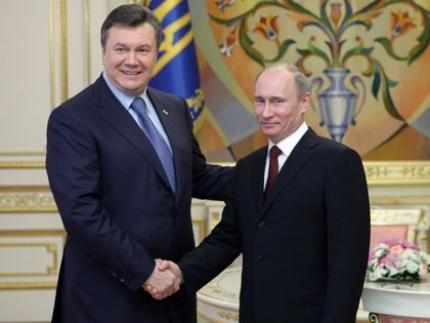
A just-published report by Russia’s premier political analyst, Lilia Shevtsova, has important implications for the post-Soviet states in general and Ukraine in particular. Titled “Russia XXI: The Logic of Suicide and Rebirth,” the report was released by the Moscow Carnegie Center in January 2013. Shevtsova, who together with democratic reformer Grigory Yavlinsky shares the distinction of having been born and raised in the West Ukrainian city of Lviv, chairs the center’s Russian Domestic Politics and Political Institutions Program and is the author of, among many other books, Putin’s Russia and Russia—Lost in Transition. When Shevtsova speaks, Western policymakers and academics listen—and post-Soviet dictators should listen.
The “Russia XXI” report has good news for democrats and well-wishers of Russia: Vladimir Putin’s days as Russia’s dictator are numbered. According to Shevtsova, “The Russian system is beginning to decay. It cannot sustain the crumbling status quo, nor can it be certain of finding a new incarnation for itself. The only real questions are what stage of decay the system is in, whether the agony of its demise has already started, and, if so, how long it will last. To be sure, the system still has some resources, if not to revive itself, then to draw out its death, and that survival instinct could take a nasty, even bloody, form.”
That last sentence suggests that the demise of Putin’s fascistoid regime could take on nasty forms with profoundly deleterious consequences for Russia and Russians:
The system no longer has adequate resources to manage society through means of mass coercion and force; the resources required for that are being quickly depleted. By opting for harsher management instruments, the regime will significantly truncate its own support base. By suppressing the relatively moderate opposition, which is trying to express itself openly and constitutionally, and by rejecting constitutional rights and freedoms, the Kremlin itself will breed a radical and destructive opposition that will act clandestinely and opt for violent methods. It is the Kremlin that is shoving these differences of opinion and opposing viewpoints into a revolutionary niche.
In its attack on pluralism, the regime is not only radicalizing the conflict and accelerating the political cycle, it is also reducing the chances of reaching an agreement between the opposition and a part of the ruling elite. As it tries to shift responsibility for the use of force to all of the elite, the Kremlin impairs the chances for the formation of a pragmatic wing ready for a peaceful exit from the Russian system.
No less serious is the fact that the current ruling elite, feeling that is has been cornered and apparently beginning to understand the nature of the challenges, has started to consciously pursue a policy that will deepen the degradation of society, preserve its atomization, and provoke ethnic and social hatreds. This is the goal of the Kremlin’s propaganda and policy: to prevent society’s consolidation against the authorities and to provoke conflicts and tensions that make the authorities the arbitrator. If this policy is successful, Russia is doomed.
In order to forestall such a dire outcome, says Shevtsova, it is imperative for the democratic opposition to get its act together as soon as possible:
The agenda for the upcoming political season contains a few objectives. One of them is consolidating the opposition and formulating an agenda that is responsive to the challenges posed by a more repressive regime. Another objective is integrating political and socioeconomic demands. Yet another is uniting all of the opposition factions and the moderates within the system ready for change under the banner of universal democratic demands and the peaceful transformation of the system.
The fast-paced events of the day and the degradation of the system may call for some ad hoc changes to the agenda, but one objective remains paramount under any circumstances: the pledge by all participants in the political process to renounce personalized power and to step down from positions of power in case of electoral defeat. This has never happened in Russian history. If Russia finally manages to do it, it will have reached its “end of history” and the beginning of a new one.
Note that Shevtsova’s analysis could be applied, word for word, to Ukraine, Belarus, Kazakhstan, and a number of other dysfunctional post-Soviet authoritarian regimes. Just as these regimes emerged from similar political and economic circumstances that may loosely be termed the “Soviet and post-Soviet legacy,” so, too, these regimes are likely to break down, collapse, or crack up for the same reasons, the primary one being their systemic unsustainability. Moreover, just as these regimes emerged pretty much at the same time, so, too, they are likely to vanish at the same time. Indeed, one can easily imagine that the collapse of any one of them—and especially of Putin’s regime—will immediately have spillover effects in the others, producing a chain reaction of regime breakdowns similar to the collapse of communism that swept East Central Europe in the course of six months in 1989. Domino theory redux, anyone?
As Shevtsova warns us, Russia’s collapse could be peaceful and lead to democratic consolidation or it could be bloody and spell Russia’s doom. Exactly the same outcomes face post-Yanukovych Ukraine, post-Lukashenko Belarus, and post-Nazarbayev Kazakhstan. It is conceivable that we’ll witness, within the next five or so years, a wave of democratic transitions in the entire post-Soviet space or a wave of bloody breakdowns. The former scenario would be wonderful, but, as Shevtsova says, it can happen if and only if the democrats prepare for it accordingly. The latter scenario—breakdown—would be a disaster for everyone concerned. Its consequences—instability, economic collapse, refugees, bloodshed—would definitely spill over into East Central Europe and, despite the iron curtain set up by the Schengen-zone countries, into the core of the European Union as well. Smart Western policymakers might consider asking themselves whether they’re doing enough to prevent that doomsday scenario from happening. The wrong way to proceed is to try to prop up doomed regimes, even if they export gas. The right way is to start working with the democratic oppositions in preparation for the day the dictators disappear.
It’s too late for the regimes in Russia, Belarus, and, probably, Kazakhstan to change: they’ve been around for too long and they’re too entrenched. It may not be too late for the significantly younger and less entrenched Yanukovych regime to try to change its spots and avoid an ignominious end. All Yanukovych need do is free Yulia Tymoshenko and Yuri Lutsenko, sell his palatial estates outside Kyiv, tell his son Sasha to go back to dentistry, fire the thuggish Minister of Education Dmitri Tabachnik, and retire before the 2015 presidential elections. Oh, and read Shevtsova’s excellent report now, when he could learn a thing or two about survival—and not several years from now, when he’s in the slammer or on the lam.
Photo Credit: premier.gov.ru
Alexander J. Motyl's Blog
- Alexander J. Motyl's profile
- 21 followers



